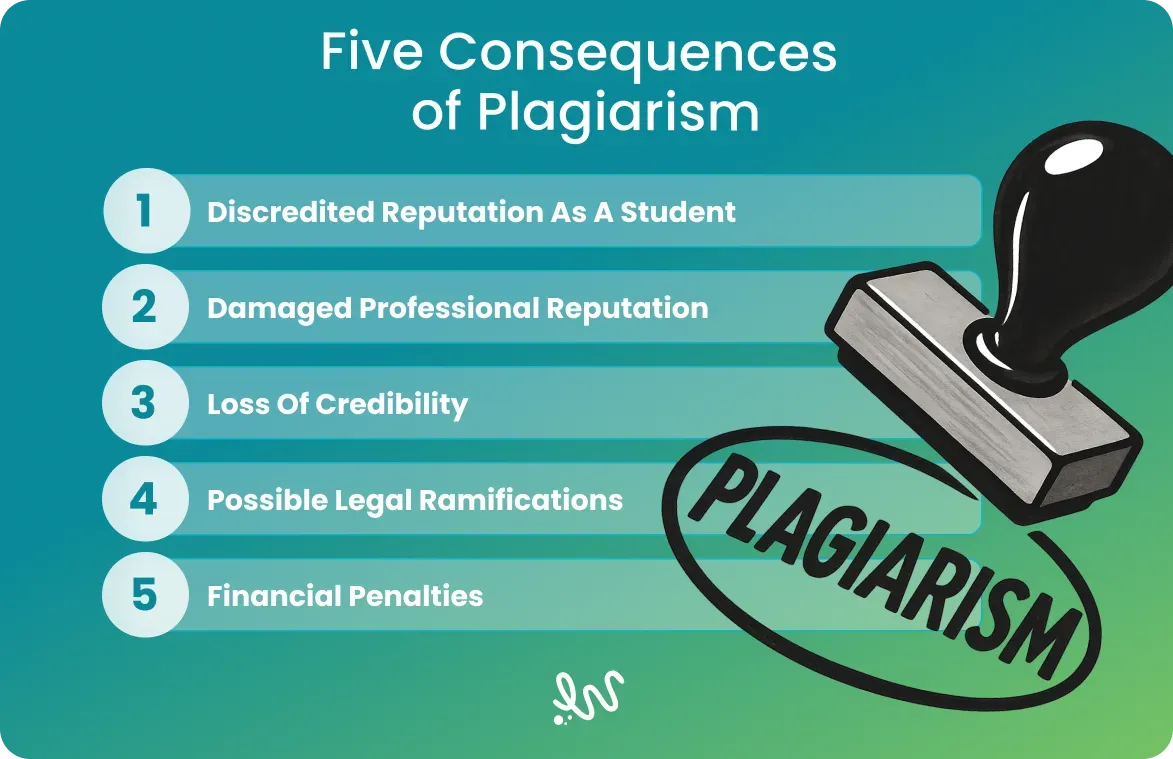The serious consequences of plagiarism affect your personal reputation, academic progress, and even future opportunities. Academic dishonesty also influences how others see your work and your credibility in professional circles. These outcomes stay with you longer than a single semester.
This article explains what happens when plagiarism appears in a student's work. You need to understand the importance of academic integrity and how you can avoid misconduct altogether. And if you need an extra hand while you get better in essay writing, professionals from WriteMyEssay can help you maintain originality in every paper.

5 Serious Consequences of Plagiarism
A plagiarism case leaves a trail that can be traced back to you even years later. Each consequence influences your career path differently. Here are five repercussions you might face if you get caught in academic misconduct:

1. Discredited Reputation as a Student
Trust in school grows gradually. A confirmed plagiarism case interrupts that growth and leaves a mark that everyone notices. Instructors may require a rewritten assignment or another attempt at the course. But that's not where the consequences stop. You will soon start sensing more eyes on your work, as if every sentence needs extra proof that it belongs to you. That pressure weighs so heavily that some students even struggle to find motivation because the situation starts to feel personal.
2. Damaged Professional Reputation
Workplaces care about consistency and honesty, which is why anyone reviewing your record looks for signs of responsibility. Plagiarism is the signal that you're unreliable. After getting caught, recommendation letters become harder to secure, and even internship supervisors might choose another candidate without explaining the reason. People remember the moment someone cut a corner, and that influences later decisions about trust and collaboration.
3. Loss of Credibility
Academic environments run on shared honesty. Research discussions, group project planning, and problem-solving in class all depend on the understanding that everyone contributes original effort. A plagiarism accusation disrupts that understanding. Professors may step back from offering research roles. Classmates might hesitate to pair up. The atmosphere shifts into one where you feel like you have to prove sincerity over and over.
4. Possible Legal Ramifications
Plagiarism sometimes involves copyrighted writing or images. When someone uses protected material without permission, the situation can move beyond school policies. Copyright laws are in place precisely to protect the author's original work. Institutions take those laws very seriously and address violations with special attention. Legal consequences vary, and they might not be too harsh every time, but even the possibility of a formal claim creates too much stress.
5. Financial Penalties
Some penalties for plagiarism carry real financial consequences. Institutions may impose fines or other financial penalties on students found guilty of academic dishonesty. They might even lose scholarships while still in college, which can disrupt their academic and career plans. These costs do not fade quickly, and they become a reminder of a single decision that completely changed your academic path and your budget.
Universities on Plagiarism Consequences
Universities are very clear about their attitude toward plagiarism, intentional or otherwise. Their policies show how seriously academic communities value originality and intellectual honesty. These statements remove any guesswork about expectations.
Why Is It So Important to Avoid Plagiarism?
Avoiding plagiarism protects intellectual identity and supports steady academic growth. The punishment for plagiarism influences more than a single grade. The consequences can reshape future opportunities and personal confidence in writing.
Reasons to maintain original work:
- Copying weakens your ability to think through ideas on your own. Original writing builds confidence that carries into harder assignments later.
- Unclear or missing citations trigger formal reviews. Those reviews often involve meetings, documentation, and academic records that stay on file.
- Once trust slips, opportunities do too. Professors hesitate to offer recommendations, research spots, or mentoring when they feel unsure about your work.
- Understanding only sticks when you work through an idea yourself. That effort shows later in exams, projects, internships, and real problem-solving moments.

Wrapping Up
Plagiarism accusations completely derail academic progress and can even lead to serious legal and monetary consequences. But beyond that, it can affect personal confidence in the long term. Once you know these outcomes and what constitutes plagiarism, you'll also understand how important honest writing habits are.
When writing feels overwhelming or unclear, you can just ask one of our professionals, 'Write my essay without plagiarism.' We can help you by guiding logical structure and proper source use so you maintain your academic integrity.
FAQ
What Happens If You Get Caught Plagiarizing?
The outcome depends on the institution, but it can include failing the assignment, repeating the course, or receiving an academic disciplinary record. The situation also influences how instructors evaluate future work.
What Is One Consequence of Plagiarism in the Real World?
Workplaces rely on reliability and clarity of contribution. A plagiarism incident can weaken trust during hiring processes, performance evaluations, or collaboration discussions.
What Are the Consequences of Plagiarism in a Legal Setting?
Copyright law protects written and creative work. Using copyrighted material without permission can lead to formal complaints or fines. Legal concerns extend beyond academic procedures.
Why Is Plagiarism Considered Wrong?
Plagiarism presents someone else’s effort as your own. It interferes with the learning process and the development of personal thinking ability, and also breaks trust in a way that's hard to recover.
Can Plagiarism Be Unintentional?
Yes, accidental plagiarism exists, and it's mostly just as serious as when it's intentional. Citation mistakes, unclear paraphrasing, or rushed writing can result in unintentional plagiarism.
Sources
- University of Glasgow - MyGlasgow - Student Learning Development - Plagiarism. (n.d.). https://www.gla.ac.uk/myglasgow/sld/plagiarism/
- Harvard University Plagiarism Policy. (n.d.). https://usingsources.fas.harvard.edu/harvard-plagiarism-policy
- Plagiarism. (2024, July 29). The University of Edinburgh. https://registryservices.ed.ac.uk/academic-services/students/conduct/academic-misconduct/plagiarism
- Guidance on plagiarism for students. (2018). University of Birmingham. https://intranet.birmingham.ac.uk/student/academic-support/registry/ug-gt/student-conduct/guidance-students.aspx



